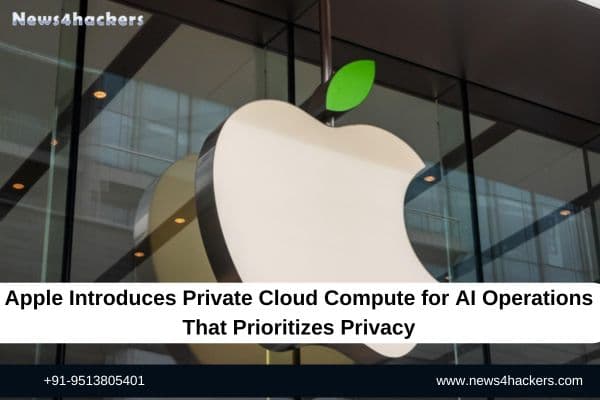Apple Introduces Private Cloud Compute for AI Operations That Prioritizes Privacy

Apple Introduces Private Cloud Compute for AI Operations That Prioritizes Privacy
Apple has disclosed the introduction of Private Cloud Compute (PCC), a “revolutionary cloud intelligence system” that is intended to execute artificial intelligence (AI) duties in the cloud while safeguarding privacy.

The tech behemoth referred to PCC as the “most comprehensive security architecture ever implemented for cloud AI compute at scale.”
The introduction of new generative AI (GenAI) features, collectively referred to as Apple Intelligence or AI for short, by the iPhone manufacturer in its next iteration of software, including iOS 18, iPadOS 18, and macOS Sequoia, coincides with PCC.
All of the Apple Intelligence features, including those that operate on-device and those that rely on PCC, are based on in-house generative models that have been trained on “licensed data, such as data chosen for improving particular capabilities, as well as publicly accessible information gathered through our web-crawler, AppleBot.”

The concept of PCC is to transfer intricate requests that necessitate additional processing power to the cloud, while simultaneously guaranteeing that data is never retained or disclosed to any third party, including Apple. This mechanism is referred to as “stateless computation” by the company.
The architecture that supports PCC is a custom-built server node that combines Apple silicon, Secure Enclave, and Secure Boot. This architecture is set against a hardened operating system that is specifically designed to handle Large Language Model (LLM) inference operations.

This not only presents an “extremely narrow attack surface,” as Apple claims but also enables it to utilize Code Signing and sandboxing to guarantee that only allowed and cryptographically measured code is executable on the data center and that user data does not escape the trusted perimeter.
“Modern technologies like Pointer Authentication Codes and sandboxing act as barriers to this kind of abuse and restrict an intruder’s horizontal movement within the PCC node,” according to the document. “The inference control and dispatch layers are written in Swift, assuring memory security, and use distinct address spaces to isolate initial processing of requests.”
“This mixture of memory safety and the principle of least privilege eliminates entire classes of cyberattacks on the inference stack itself and restricts the level of control and capability that an effective assault can obtain.”

An additional noteworthy security and privacy measure is the routing of PCC requests through an Oblivious HTTP (OHTTP) relay that is operated by an independent party. This mechanism effectively prevents an attacker from using the IP address to correlate the requests to a specific individual, thereby concealing the origin (i.e., IP address).
It is important to note that Google employs OHTTP relays in the Chrome web browser for Safe Browsing to protect users from visiting potentially malicious sites, as well as as part of its Privacy Sandbox initiative.

Apple also stated that the privacy aspects of the code running on Apple silicon servers can be verified by independent security experts. Additionally, the company’s PCC cryptographically guarantees that its devices do not communicate with a server unless the software has been publicly recorded for inspection.
“Every production Private Cloud Compute software image will be published for independent binary inspection — including the OS, applications, and all relevant executables, which researchers can verify against the measurements in the transparency log,” according to the organization.
“Software will be published within 90 days of inclusion in the log, or after relevant software updates are available, whichever is sooner.”

In addition to Apple Intelligence, an integration with OpenAI’sChatGPT is present in Siri and systemwide Writing Tools. This integration generates text and images based on user-provided prompts, with Apple emphasizing the privacy protections that are built into the process for those who consent to access the virtual assistant.
“Their IP addresses are obscured, and OpenAI won’t store requests,” according to Apple. “ChatGPT’s data-use policies apply for users who choose to connect their account.”
Apple Intelligence, which is anticipated to be broadly accessible later this fall, will be restricted to the iPhone 15 Pro, iPhone 15 Pro Max, and iPad and Mac with M1 and later, provided that Siri and the device language are configured to U.S. English.

Other new privacy features that Apple has implemented include the ability to lock and conceal specific apps behind a passcode, Face ID, or Touch ID; the ability to select which contacts to share with an app; a dedicated Passwords app; and a refreshed Privacy & Security section in Settings.
The Passwords app also includes a setting that automatically upgrades existing accounts to passkeys, as reported by MacRumors. Additionally, in order to mitigate monitoring, Apple has replaced the Private Wi-Fi Address toggle for Wi-Fi networks with a new Rotate Wi-Fi Address setting.
About The Author:
Yogesh Naager is a content marketer who specializes in the cybersecurity and B2B space. Besides writing for the News4Hackers blog, he’s also written for brands including CollegeDunia, Utsav Fashion, and NASSCOM. Naager entered the field of content in an unusual way. He began his career as an insurance sales executive, where he developed an interest in simplifying difficult concepts. He also combines this interest with a love of narrative, which makes him a good writer in the cybersecurity field. In the bottom line, he frequently writes for Craw Security.
READ MORE ARTICLE HERE
SecShow, a Chinese Threat Actor, Performs Extensive DNS Probing Across the Globe
Describing Apple Lockdown Mode: What is it, and How Does it Prevent Spyware Attacks?






